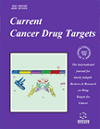-
s Pleiotropic Role of HSF1 in Neoplastic Transformation
- Source: Current Cancer Drug Targets, Volume 14, Issue 2, Feb 2014, p. 144 - 155
-
- 01 Feb 2014
Abstract
HSF1 (Heat Shock transcription Factor 1) is the main transcription factor activated in response to proteotoxic stress. Once activated, it induces an expression of heat shock proteins (HSPs) which enables cells to survive in suboptimal conditions. HSF1 could be also activated by altered kinase signaling characteristic for cancer cells, which is a probable reason for its high activity found in a broad range of tumors. There is rapidly growing evidence that HSF1 supports tumor initiation and growth, as well as metastasis and angiogenesis. It also modulates the sensitivity of cancer cells to therapy. Functions of HSF1 in cancer are connected with HSPs’ activity, which generally protects cells from apoptosis, but also are independent of its classical targets. HSF1-dependent regulation of non-HSPs genes plays a role in cell cycle progression, glucose metabolism, autophagy and drug efflux. HSF1 affects the key cell-survival and regulatory pathways, including p53, RAS/MAPK, cAMP/PKA, mTOR and insulin signaling. Although the exact mechanism of HSF1 action is still somewhat obscure, HSF1 is becoming an attractive target in anticancer therapies, whose inhibition could enhance the effects of other treatments.


